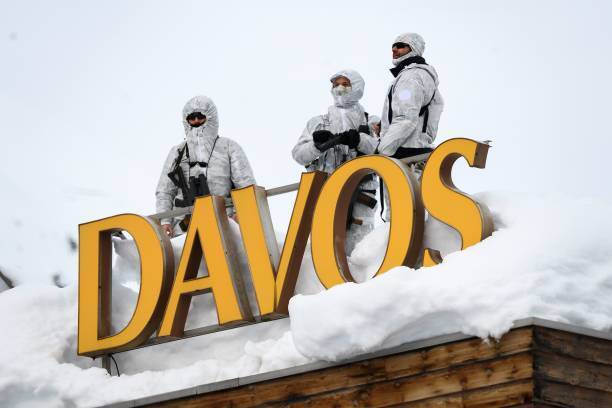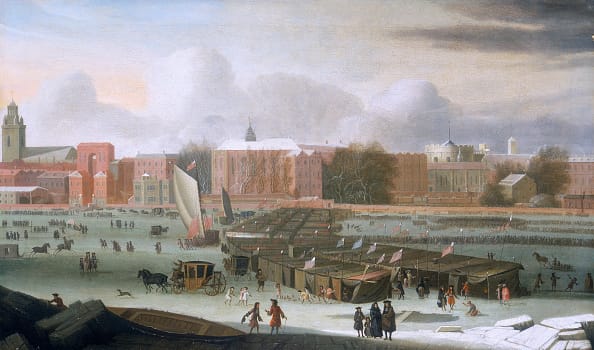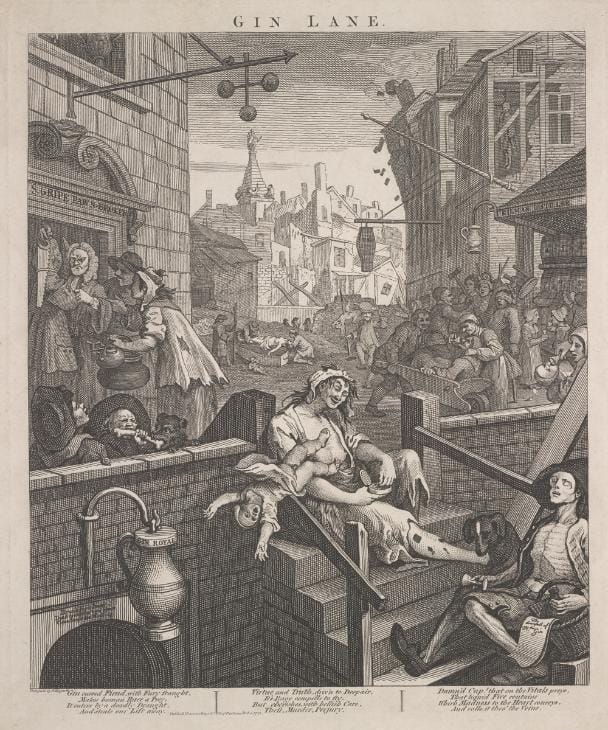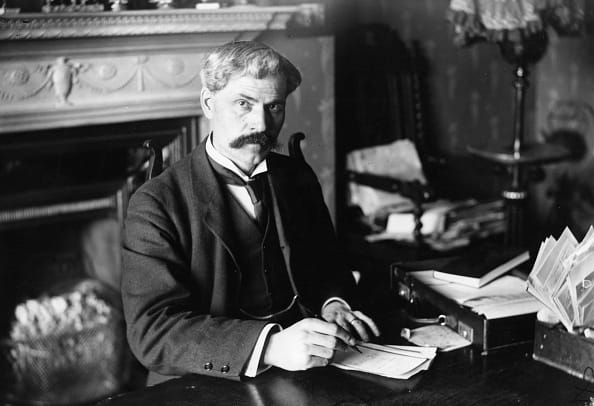Comment

Snipers watching over the great and the good in 2018. Fabrice Coffrini/AFP/Getty
Davos elites have lost control
The far left and far right agree on one thing, says Walter Russell Mead in The Wall Street Journal: the World Economic Forum, meeting in Davos this week, is an “all-powerful network” imposing its “nefarious agenda” on the rest of the world. “This reading gets Davos exactly wrong.” The key tenets of the “Davos agenda” – global security, an integrated world economy, progress on decarbonisation, gender equality and alleviating poverty – are neither secret nor terribly nefarious. And far from successfully imposing them on the world, the Davos elites are “wringing their hands as the dream slowly dies”.
The war in Ukraine grinds on; the Middle East has “erupted into chaos”; the rift between China and the West is only widening. With both the US and the EU introducing import restrictions to reverse the economic damage from low-wage, low-regulation production in China and elsewhere, the Davos dream of free trade has never felt further away. The World Bank warns that the 2020s could be a “lost decade”, with poor countries hit hardest. Given all this, “the Davos hills are alive with the sounds of failure”. And to cap it all, the meeting’s hilarious “Rebuilding Trust” theme seems to assume ordinary people are losing trust in their leaders because “disinformation has muddled their brains” or something. But that’s balls. They are losing confidence because the establishment’s approach to the key problems of the day isn’t working. In the end, this isn’t a crisis of trust. “It is a crisis of competence.”
Heroes and villains

Villain
Ed Balls, for kicking his Good Morning Britain co-host Susanna Reid in the head. Sitting in a mocked-up plane seat ahead of a debate on public transport etiquette, the former shadow chancellor swung both feet on to the headrest in front of him, accidentally clipping Reid on the noggin.
Hero
Pope Francis, for proclaiming sexual pleasure “a gift from God”. The pontiff made the remarks during a catechesis devoted to the “vice of lust” earlier this week. “We must defend love,” he said, rather gloomily adding that it was being “undermined by pornography”.
Hero
Japanese novelist Rie Kudan, for making the robots do the hard work. The 33-year-old won one of Japan’s most prestigious literary awards this week, and promptly revealed that about 5% of the AI-themed book, The Tokyo Tower, was generated by ChatGPT. One member of the judging committee described the novel as “almost flawless”.
Hero
Bristol Central, which has been named as the constituency with the highest proportion of voters who want immigration to increase. This has given me an idea, says Michael Deacon in The Daily Telegraph. Instead of wasting time trying to send immigrants to Rwanda, the government should give them “free train tickets to Bristol Temple Meads”. The Corbynites of Bristol Central get more immigration, just as they wanted. Everyone else gets less immigration, just as they wanted. And the immigrants get to live in Britain, just as they wanted. It’s the perfect solution.
Property

THE TOWNHOUSE Part of Mornington Crescent, one of the best-preserved Georgian terraces in London, this Grade-II listed townhouse unfolds over five storeys, with three main bedrooms and period features including a black marble fireplace, ornate cornicing and panelled doors. A self-contained apartment on the lower ground floor provides two further bedrooms, along with an additional kitchen and bathroom. Mornington Crescent Tube station is a two-minute walk. £2.9m.
Quirk of history

A carnival on the water. Museum of London/Heritage Images/Getty
The year the Thames froze over for two months
Nearly three-and-a-half centuries ago, England was in the grip of a winter so cold it became known as “The Great Frost”, says Bethan Bell on the BBC. Temperatures in London were recorded at around -4C indoors and -12C outside. “The lowest reported was -30C.” Whole families froze and starved, “cattle and deer died where they stood”. The journalist Charles Mackay wrote that it was “so cold the trunks of trees exploded with cracks as loud as the firing of musketry”. The diarist John Evelyn claimed “crows’ feet were frozen to their prey”, and a monk wrote that he had seen “soup which has accidentally spilled while being stirred, freezing at one side while the other still steams”.
The Thames froze, topped by a layer of ice a foot thick, and remained frozen for two months. Londoners soon erected booths and stalls, creating a “frost fair”. Out-of-work watermen pivoted to guiding tourists out on to the ice to see the attractions, and some attached runners to the bottoms of their boats, turning them into sledges. Evelyn described the “bull-baiting, races, puppet shows and many food and drink stalls” – including an entire ox roasted on the ice near Whitehall – as a “bacchanalian triumph or carnival on the water”. Souvenirs were produced, ranging from engraved silver spoons to tickets printed from presses that had been hauled onto the ice. Another diarist, “who rejoiced in the name of Narcissus Luttrell”, recorded on 4 February 1684 that there were “three or four printing houses on the ice” when he visited. There hasn’t been such a major freeze since, and the last, in 1814, lasted only four days.
Advertisement
With 18 beautiful new villas added to Red Savannah’s portfolio in Provence, now is time to book your perfect summer holiday. Dotted across glorious rural Provençale countryside, historic bastides and pretty domaines have all been renovated to exceptional standards, each offering a concierge with the local knowledge to put you firmly on the inside track. Whether you desire splendid isolation, or a fully staffed property, our expert team are always happy to help. Book a villa in Provence by 29th February 2024 to receive six complimentary bottles of Whispering Angel on arrival. Click here and quote ‘The Knowledge’. Ts & Cs apply.
Noted

The people of Britain have “long been famous for their drinking”, says Henry Jeffreys in The Spectator. A Frenchman writing in the 12th century described the various races of Europe: “The French were proud and womanish; the Germans furious and obscene; the Lombards greedy, malicious, and cowardly; and the English were drunkards and had tails.” By the mid-1700s, at the height of the gin craze immortalised in William Hogarth’s Gin Lane (above), the English were averaging 20 bottles of gin a year, per person. But sadly, we seem to have lost our taste for alcohol. A third of pub visits are now booze-free, and a quarter of 16- to 24-year-olds don’t even drink a drop. Whisper it, but Britain has “sobered up”.
Comment

Barry Keoghan in Saltburn
Down with the middle classes!
“Only someone with a name like Emerald Fennell could make a film like Saltburn,” says Finn McRedmond in The New Statesman, a treatise on the “horror and aesthetic depravity of the petite bourgeoisie”. Critics have missed this, mistaking it for a tale of “terrible toffs” and their “toxic elitism”. In fact, the real villain is a boy from the suburbs with a pushy mum and a front lawn. The film might claim to satirise the fripperies of the British aristocracy, but this is dishonest. “The film’s brain says ‘eat the rich!’ but its soul says ‘eww, the middle class’.”
This is nothing new. There is a long history of viewing the middle classes as the “true villains” of Britain: “untrustworthy and covetous social climbers with none of the exotic intrigue of the poor, nor the blasé taste of the rich”. The most evil character in Harry Potter isn’t Voldemort; he’s far more appealing than the ghastly Dursleys of Privet Drive, a “boorish Nimby patriarch and his curtain-twitching wife”, who haven’t earned the right to their petty snobberies. “Middle-classness is not incidental to their evil but the source of it.” In Keeping Up Appearances, Hyacinth Bucket calls her bungalow “the Residence” and pronounces her name “bouquet”. “We laugh because she does not know her rightful place in the hierarchy.” And in Howard’s End, the upwardly-mobile Leonard Bast is killed by a falling bookcase. Forster’s metaphor is none-too-subtle: he is literally “crushed by his class pretensions”.
🏚️🤔 This goes both ways. Concealing a relatively privileged upbringing is “one of the most celebrated British traditions”, even if it means “climbing down the social ladder”. The same John Lennon who wrote Working Class Hero grew up in a house with a name. Jamie Oliver adopted a mockney idiolect, but his admission that his parents owned a pub-slash-restaurant in leafy Clavering in Essex “always struck me as reluctant”.
Inside politics

Ramsay MacDonald: “the man who betrayed his party for power”. Getty
The ghost of Labour’s Judas
A century ago next week, Ramsay MacDonald became Labour’s first prime minister, says Tom McTague in UnHerd. Easily Britain’s “most working-class” premier, he rose from nothing to the top – and yet today he is shunned as “Labour’s Judas, the man who betrayed his party for power”. In 1931, MacDonald made the fateful decision to form a “national government” coalition rather than go into opposition with the rest of his party, “who wouldn’t back the spending cuts he wanted to balance the budget during the Great Depression”. He effectively enabled a Tory landslide in that year’s election, and his party has never forgiven him.
Every elected Labour PM since MacDonald has similarly been accused of betrayal. Tony Blair was dubbed “Ramsay MacBlair” for his fiscal conservatism. Clement Attlee outraged the left when he introduced prescription charges in the NHS. Harold Wilson was “tarred” for a round of austerity in 1966 to try and prop up the value of the pound. The philosopher Roger Scruton argued that the liberal “spirit of improvement”, which hopes to overcome seemingly intractable difficulties and differences, contrasts with the conservative instinct “to make least worst choices based on incomplete information”. Labour leaders “campaign as liberals but govern as conservatives” – in power, they realise they must choose between options they “previously hoped could be reconciled”. There is little reason to believe Keir Starmer, given the dire state of Britain today, can avoid the fate of his predecessors.
Weather

Quoted
“Even if you’re on the right track, you’ll get run over if you just sit there.”
American humourist Will Rogers


